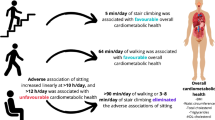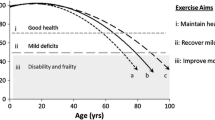Abstract
The huge inter-individual differences in how people age have prompted researchers to examine whether people’s own perception of how old they are—their subjective age—could be a better predictor of relevant outcomes than their actual chronological age. Indeed, how old people feel does predict mortality hazards, and health-related measures such as walking speed may account for this association. In the present study, we extended this line of work by investigating whether subjective age also predicts walking speed and running speed in daily life or whether the predictive effects of subjective age for behavior manifest only within a controlled performance situation. We used data from 80 older participants (age range 62–82 years; M = 69.50, SD = 4.47) from the Berlin Aging Study II (BASE-II). Subjective age was assessed by self-report. Walking speed in the laboratory was measured with the Timed Up and Go test, and walking speed and running speed in real life were measured with an accelerometer. Results showed that compared to participants who felt older, those who felt younger than they actually were indeed walked faster in the laboratory, but they did not walk or run faster in real life. These patterns of results held when age, gender, education, BMI, comorbidity, depression, physical activity, and cognition were covaried. We discuss the role of stereotype threat in accounting for these results.

Similar content being viewed by others
References
Baltes, PB, Lindenberger, U, Staudinger, UM (2006). Lifespan theory in developmental psychology. In R. M. Lerner (Ed.), Handbook of child psychology Vol. 1: Theoretical models of human development (6th ed., pp. 569–664). New York, NY: Wiley. doi: 10.1002/9780470147658.chpsy0111
Bertram L, Böckenhoff A, Demuth I, Düzel S, Eckardt R, Li S-C, Steinhagen-Thiessen E (2014) Cohort profile: the Berlin aging study II (BASE-II). Int J Epidemiol 43:703–712. https://doi.org/10.1093/ije/dyt018
Caspersen CJ, Powell KE, Christenson GM (1985) Physical activity, exercise, and physical fitness: definitions and distinctions for health-related research. Public Health Rep 100:126–131
Cesari M, Kritchevsky SB, Penninx BW, Nicklas BJ, Simonsick EM, Newman AB, Visser M (2005) Prognostic value of usual gait speed in well-functioning older people—results from the health, aging and body composition study. J Am Geriatr Soc 53:1675–1680. https://doi.org/10.1111/j.1532-5415.2005.53501.x
Charlson ME, Pompei P, Ales KL, MacKenzie CR (1987) A new method of classifying prognostic comorbidity in longitudinal studies: development and validation. J Chronic Dis 40:373–383. https://doi.org/10.1016/0021-9681(87)90171-8
Düzel S, Völkle M, Düzel E, Gerstorf D, Drewelies J, Steinhagen-Thiessen E, Demuth I, Lindenberger U (2016) The subjective health horizon questionnaire (SHH-Q): assessing future time perspectives for facets of an active lifestyle. Gerontology 62:345–353. https://doi.org/10.1159/000441493
Freter SH, Fruchter N (2000) Relationship between timed, up and go‘and’ gait time in an elderly orthopaedic population. Clin Rehabil 14:96–101. https://doi.org/10.1191/026921500675545616
Gerstorf D, Hülür G, Drewelies J, Eibich P, Düzel S, Demuth I, Ghisletta P, Steinhagen-Thiessen E, Wagner GG, Lindenberger U (2015) Secular changes in late-life cognition and well-being: towards a long bright future with a short brisk ending? Psychol Aging 30:301–310. https://doi.org/10.1037/pag0000016
Gerstorf D, Bertram L, Lindenberger U, Pawelec G, Demuth I, Steinhagen-Thiessen E, Wagner GG (2016) The Berlin aging study II–an overview. Gerontology 62:311–315. https://doi.org/10.1159/000441495
Gouveia ÉR, Gouveia BR, Ihle A, Kliegel M, Maia JA, Badia SB, Freitas DL (2017) Correlates of lifestyle and functional fitness status influencing health-related quality of life in community-dwelling older people. Qual Life Res 26:1561–1569. https://doi.org/10.1007/s11136-017-1502-z
Ihira H, Furuna T, Mizumoto A, Makino K, Saitoh S, Ohnishi H, Makizako H (2015) Subjective physical and cognitive age among community-dwelling older people aged 75 years and older: differences with chronological age and its associated factors. Aging Ment Health 19:756–761. https://doi.org/10.1080/13607863.2014.967169
Kotter-Grühn D, Kleinspehn-Ammerlahn A, Gerstorf D, Smith J (2009) Self-perceptions of aging predict mortality and change with approaching death: 16-year longitudinal results from the Berlin Aging Study. Psychol Aging 24:654. https://doi.org/10.1037/a0016510
Lindenberger U, Von Oertzen T, Ghisletta P, Hertzog C (2011) Cross-sectional age variance extraction: what’s change got to do with it? Psychol Aging 26:34–47. https://doi.org/10.1037/a0020525
Marshall SJ, Levy SS, Tudor-Locke CE, Kolkhorst FW, Wooten KM, Ji M, Macera CA, Ainswort BE (2009) Translating physical activity recommendations into a pedometer-based step goal: 3000 steps in 30 minutes. Am J Prev Med 36:410–415. https://doi.org/10.1016/j.amepre.2009.01.021
Meyer A, Salewsky B, Spira D, Steinhagen-Thiessen E, Norman K, Demuth I (2016) Leukocyte telomere length is related to appendicular lean mass: cross-sectional data from the Berlin aging study II (BASE-II). Am J Clin Nutr 103:178–183. https://doi.org/10.3945/ajcn.115.116806
Middleton A, Fritz SL, Lusardi M (2015) Walking speed: T the functional vital sign. J Aging Phys Act 23:314–322. https://doi.org/10.1123/japa.2013-0236
Motl RW, Weikert M, Suh Y, Sosnoff JJ, Pula J, Soaz C, Daumer M (2012) Accuracy of the actibelt ® accelerometer for measuring walking speed in a controlled environment among persons with multiple sclerosis. Gait Posture 35:192–196. https://doi.org/10.1016/j.gaitpost.2011.09.005
Mueller S, Wagner J, Drewelies J, Duezel S, Eibich P, Specht J, Demuth I, Steinhagen-Thiessen E, Wagner GG, Gerstorf D (2016) Personality development in old age relates to physical health and cognitive performance: evidence from the Berlin aging study II. J Res Pers 65:94–108. https://doi.org/10.1016/j.jrp.2016.08.007
Nelson EA, Dannefer D (1992) Aged heterogeneity: Fact or fiction? the fate of diversity in gerontological research. Gerontologist 32:17–23. https://doi.org/10.1093/geront/32.1.17
Pasma JH, Stijntjes M, Ou SS, Blauw GJ, Meskers CG, Maier AB (2014) Walking speed in elderly outpatients depends on the assessment method. Age 36:1–8. https://doi.org/10.1007/s11357-014-9736-y
Podsiadlo D, Richardson S (1991) The Timed “Up & Go”: A test of basic functional mobility for frail elderly persons. J Am Geriatr Soc 39:142–148. https://doi.org/10.1111/j.1532-5415.1991.tb01616.x
Radloff LW (1977) The CES-D scale: a self-report depression scale for research in the general population. Appl Psychol Meas 1:385–401. https://doi.org/10.1177/014662167700100306
Rubin DC, Berntsen D (2006) People over forty feel 20% younger than their age: subjective age across the lifespan. Psychon Bull Rev 13:776–780. https://doi.org/10.3758/BF03193996
Schimpl M, Lederer C, Daumer M (2011) Development and validation of a new method to measure walking speed in free-living environments using the Actibelt® Platform. PLoS ONE 6:e23080. https://doi.org/10.1371/journal.pone.0023080
Simonsick EM, Montgomery PS, Newman AB, Bauer DC, Harris T (2001) Measuring fitness in healthy older adults: the health ABC long distance corridor walk. J Am Geriatr Soc 49:1544–1548. https://doi.org/10.1046/j.1532-5415.2001.4911247.x
Spuling SM, Miche M, Wurm S, Wahl H-W (2013) Exploring the causal interplay of subjective age and health dimensions in the second half of life A cross-lagged panel analysis. Z Gesundheitspsychol 21:5–15. https://doi.org/10.1026/0943-8149/a000084
Stephan Y, Sutin AR, Terracciano A (2015) “Feeling younger, walking faster”: subjective age and walking speed in older adults. Age 37:1–12. https://doi.org/10.1007/s11357-015-9830-9
Stephan Y, Sutin AR, Terraciano A (2016) Feeling older and risk of hospitalization: evidence from three longitudinal cohorts. Health Psychol 35:634–637. https://doi.org/10.1037/hea0000335
Studenski S, Perera S, Patel K, Rosano C, Faulkner K, Inzitari M, Nevitt M (2011) Gait speed and survival in older adults. JAMA 305:50–58. https://doi.org/10.1001/jama.2010.1923
Swift HJ, Lamont RA, Abrams D (2012) Are they half as strong as they used to be? An experiment testing whether age-related social comparisons impair older people’s hand grip strength and persistence. BMJ Open 2:e001064. https://doi.org/10.1136/bmjopen-2012-001064
Sylvia LG, Bernstein EE, Hubbard JL, Keating L, Anderson EJ (2014) A practical guide to measuring physical activity. J Acad Nutr Diet 114:199–208. https://doi.org/10.1016/j.jand.2013.09.018
Uotinen V, Rantanen T, Suutama T (2005) Perceived age as a predictor of old age mortality: a 13-year prospective study. Age Ageing 34:368–372. https://doi.org/10.1093/ageing/afi091
Verbrugge LM, Jette AM (1994) The disablement process. Soc Sci Med 38:1–14. https://doi.org/10.1016/0277-9536(94)90294-1
Viccaro LJ, Perera S, Studenski SA (2011) Is timed up and go better than gait speed in predicting health, function, and falls in older adults? J Am Geriatr Soc 59:887–892. https://doi.org/10.1111/j.1532-5415.2011.03336.x
Weiss D, Lang FR (2012) “They” are old but “I” feel younger: age-group dissociation as a self-protective strategy in old age. Psychol Aging 27:153–163. https://doi.org/10.1037/a0024887
Acknowledgements
This manuscript reports data from the Berlin Aging Study II (BASE-II). The BASE-II research project (Co-PIs are Lars Bertram, Denis Gerstorf, Ulman Lindenberger, Graham Pawelec, Elisabeth Steinhagen-Thiessen, and Gert G. Wagner) is supported by the German Federal Ministry of Education and Research (Bundesministerium für Bildung und Forschung, BMBF) under grant numbers #16SV5536 K, #16SV5537, #16SV5538, and #16SV5837, and #01UW0808). Another source of funding is the Max Planck Institute for Human Development, Berlin, Germany. Additional contributions (e.g., equipment, logistics, personnel) are made from each of the other participating sites. Further details about the study can be obtained at https://www.base2.mpg.de/en. We thank Martin Daumer from the Sylvia Lawry Centre for Multiple Sclerosis Research (SLCMSR), e.V., Munich, Germany for his input regarding the use of the actibelt accelerometer. The SLCMSR co-developed the device. N. N. was supported by a Horizon 2020 Marie Sklodowska-Curie Individual Fellowship (grant number H2020-MSCA-IF-2014 661555).
Author information
Authors and Affiliations
Corresponding author
Additional information
Responsible Editor: D.J.H. Deeg.
Rights and permissions
About this article
Cite this article
Notthoff, N., Drewelies, J., Kazanecka, P. et al. Feeling older, walking slower—but only if someone’s watching. Subjective age is associated with walking speed in the laboratory, but not in real life. Eur J Ageing 15, 425–433 (2018). https://doi.org/10.1007/s10433-017-0450-3
Published:
Issue Date:
DOI: https://doi.org/10.1007/s10433-017-0450-3




